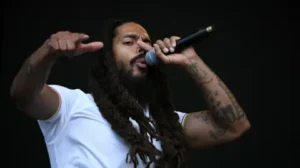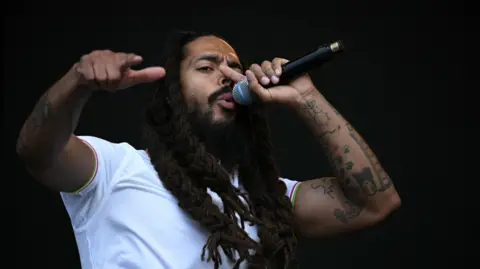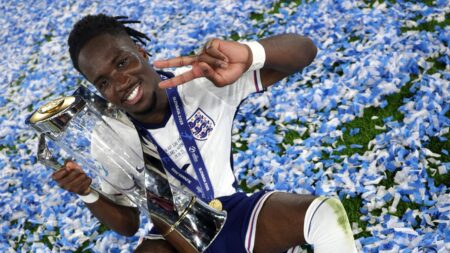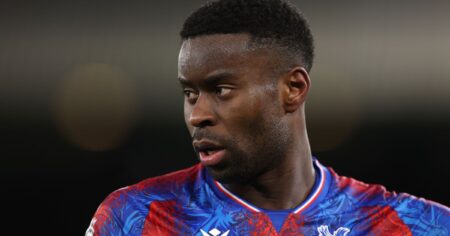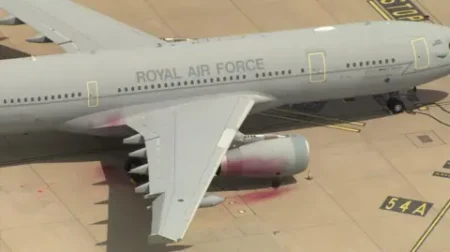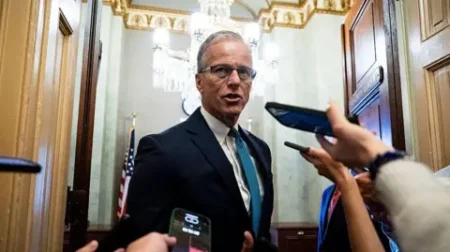**The Government Condemns Chants at Glastonbury Festival Aired Live on BBC**
In a recent incident that has garnered significant attention, the UK government has expressed strong disapproval of a set performed by the British rap punk duo Bob Vylan at the Glastonbury Festival, which was broadcast live by the BBC. During their performance, lead rapper Bobby Vylan led chants calling for “death” to the Israeli Defense Forces (IDF) and advocating for a free Palestine, statements that have sparked controversy and backlash. This series of events unfolded shortly before an upcoming performance by the Belfast rap trio, Kneecap.
A spokesperson for the BBC described some of the remarks made during the performance as “deeply offensive,” adding that the network had issued a warning onscreen regarding the use of “very strong and discriminatory language.” In light of the uproar, the BBC has confirmed that the set will not be available for rewatch on BBC iPlayer, underscoring the sensitivity surrounding the issue and the responsibility of the broadcaster in addressing it.
In a statement on the matter, police officials revealed that they are currently reviewing video footage of the performance and comments made by both Bob Vylan and Kneecap to determine if any legal offenses had occurred. As public sentiments surrounding freedom of speech and provocative statements continue to intersect with issues of national and international significance, this case presents a complex legal and moral dilemma.
Following the incident, Culture Secretary Lisa Nandy contacted BBC Director General Tim Davie, seeking an “urgent explanation” regarding the level of due diligence that was applied before the performance was aired. The government expressed satisfaction with the decision not to rebroadcast the performance, reiterating their position against any forms of discourse that may incite violence or hate speech.
Bob Vylan’s energetic performance on the West Holts stage came just ahead of the Irish-language rap group Kneecap, who have also been in the media spotlight recently. Kneecap’s own rapper, Liam Óg Ó hAnnaidh, performing under the alias Mo Chara, faces a terrorism-related charge stemming from an incident last year where he allegedly displayed a flag associated with the listed terrorist organization, Hezbollah, during a performance. He has denied this allegation, asserting his innocence in court.
The response from Kneecap during their own performance was equally charged, as they directed expletive-laden chants targeting Prime Minister Sir Keir Starmer, who had previously criticized their upcoming appearance at the festival as “not appropriate.” This exchange epitomizes the growing tensions within the UK political climate, especially in relation to cultural expressions in performance art.
In light of the sets from both Bob Vylan and Kneecap, officials from Avon and Somerset Police have indicated that they will conduct a comprehensive review of the footage to evaluate whether any statements made could warrant a criminal investigation. The force has underscored the importance of their role in assessing public statements that may cross legal boundaries, especially in relation to ongoing discussions surrounding violence and conflict.
As this situation continues to develop, the broader implications of the events at Glastonbury resonate beyond the confines of the music festival, reflecting deeper societal debates about the roles of artists in political discourse and the responsibilities of media outlets in moderating content that touches on sensitive subjects. The clash between artistic expression and societal norms poses ongoing questions about where lines should be drawn and how free speech is upheld in the modern landscape. As stakeholders, ranging from government representatives to artists and audiences, navigate these discussions, the ramifications will undoubtedly shape future cultural events and their broadcasting considerations.



